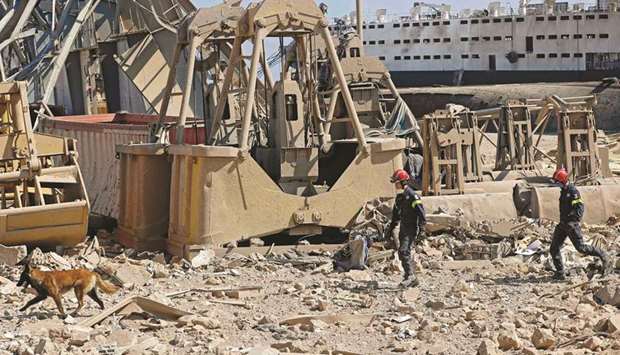Rescuers combed through the rubble of Beirut port yesterday in a search for survivors watched breathlessly by relatives of the missing, with authorities making five new arrests in a high-profile probe.
Shock has turned to anger in Lebanon since Tuesday’s colossal explosion killed at least 154 people and devastated swathes of the capital, with security forces firing tear gas at demonstrators who gathered near parliament late Thursday.
The revelation that a huge shipment of hazardous ammonium nitrate fertiliser had languished for years in a warehouse in the heart of the capital served as shocking proof to many Lebanese of the rot at the core of their political system.
What ignited the 2,750 tonnes of fertiliser is still unclear — officials have said work had recently begun on repairs to the warehouse, while others suspected fireworks which were stored either in the same place or nearby.
Near the seat of the explosion, by the carcass of the port’s giant grain silos, rescue teams from France, Germany, Italy and other countries co-ordinated their search efforts.
Four bodies were uncovered in the search area next to an exit staircase by the port’s control room, where a significant number of people were expected to have been working at the time of the blast.
No one has been found alive.”I am waiting to hear that you have been rescued alive, my dear,” tweeted Emilie Hasrouty, whose brother is among the missing.
“There wasn’t a door I didn’t knock on to know what happened to you, and now that the waiting is almost over, I am paralysed with fear.” At the port, Russian rescuers were ankle-deep in corn, as excavators removed mangled shipping containers.
Civil defence teams anxiously watched a sniffer dog as he paced around a gap under a fallen crane.
An eerie sense of calm filled the once-bustling port, reduced to an enormous scrapyard.
The only sounds are those of heavy machinery cutting through forests of twisted iron rods and mountains of concrete rubble to clear a path for the rescuers.
Beirut has received a stream of international assistance since the blast, with the president of the European Council, Charles Michel, set to visit the ravaged capital today.
The World Food Programme said it would be allocating food parcels to affected families and boosting wheat imports to replace lost stocks from the port’s disembowelled silos.
The World Health Organisation, meanwhile, called for $15mn to cover immediate emergency trauma and humanitarian health needs.
Lebanon’s hospitals, already strained by a wave of coronavirus cases and a severe economic crisis, were severely damaged by the blast and have been overwhelmed by casualties.
Relief flights from Iran among others landed in Lebanon yesterday, following others from France, Kuwait, Qatar and Russia. Two days after the blast, Lebanese were flocking to a 20-tent Russian field hospital newly established in the capital’s largest sport stadium.
They included a 93-year-old man suffering back and chest pains after Tuesday’s blast and a Syrian three-year-old whose scalp was scarred by a shard of glass.
The United Nations said up to 100,000 children are among the 300,000 people made homeless, including many who have been separated from their families.
With destruction from the blast extending over half of the capital and the damage expected to cost more than $3bn, world leaders have backed calls from ordinary Lebanese for those responsible to be held accountable.
Lebanese authorities had announced their own probe into Tuesday’s explosion and by Friday afternoon had detained 21 people, including customs officials and port engineers, a judicial source said.
The port’s general manager Hassan Koraytem was among them, the source added.
Dozens more were being interrogated by Lebanon’s military court, which is focusing its efforts on administrative and security officials at the port as well as government authorities who may have ignored warnings about explosive materials at the port.
“The list of arrests will reach the top guys, who are now among the suspects,” the source said.

French rescuers search the Beirut port yesterday, three days after a massive blast shook the Lebanese capital.
